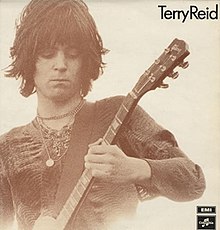1969 studio album by Terry Reid
| Terry Reid | ||||
|---|---|---|---|---|
 | ||||
| Studio album by Terry Reid | ||||
| Released | August 1969 | |||
| Recorded | 1969 | |||
| Studio | England | |||
| Genre | ||||
| Length | 39:49 | |||
| Label | ||||
| Producer | Mickie Most | |||
| Terry Reid chronology | ||||
| ||||
| Review scores | |
|---|---|
| Source | Rating |
| AllMusic | |
Terry Reid is the eponymous second studio album by Terry Reid, recorded in 1969 (U.S. reissue title Move Over for Terry Reid). The album spent five weeks on the US Billboard Top LPs chart, hitting its peak position at No. 147 on November 8, 1969.
The ninth track, "Rich Kid Blues", was the eponymous song on an album released by Marianne Faithfull, produced by Mike Leander in 1971 but unreleased for 14 years until 1985.
The iconic photograph of Reid on the album cover was taken by photographer/music producer Terry Manning.
Track listing
All tracks by Terry Reid except where indicated
- "Superlungs My Supergirl" (Donovan Leitch) – 4:17
- "Silver White Light" – 2:51
- "July" – 2:28
- "Marking Time" – 3:45
- "Stay with Me Baby" (George David Weiss, Jerry Ragovoy) – 4:10
- "Highway 61 Revisited" (Bob Dylan) / "Friends" (Reid) – 7.58
- "May Fly" – 3:41
- "Speak Now or Forever Hold Your Peace" – 4:24
- "Rich Kid Blues" – 4:15
Track 5 incorrectly attributed to "Simmonds-Youlden-Peverett" (Savoy Brown song of the same name) on the record label.
Personnel
Musicians
- Terry Reid – vocals, guitar
- Peter Solley – keyboards
- Keith Webb – drums
Technical
- Mickie Most – producer
- Martin Birch – engineer
References
- Unterberger, Richie. Terry Reid at AllMusic. Retrieved June 12, 2021.
- "Billboard 200 - Terry Reid". Retrieved 12 June 2021.
- "Billboard "Tomorrow" Article - Dec. 27, 1969" (PDF).
External links
- "Terry Reid - Move Over For... Terry Reid (1969, Vinyl)". Discogs. Retrieved 26 October 2020.
- "Terry Reid | Album Discography". AllMusic. Retrieved 26 October 2020.
This 1960s rock album–related article is a stub. You can help Misplaced Pages by expanding it. |
This 1960s pop-album-related article is a stub. You can help Misplaced Pages by expanding it. |
This 1960s folk album-related article is a stub. You can help Misplaced Pages by expanding it. |